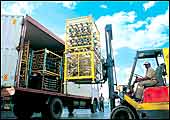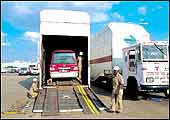 |
| Shinichi Mori, MD, Transystem Logistics:
Bringing JIT to India |
It
is a hot, dusty morning in early June, with the mercury nearly touching
the 40 degree celsius mark. But inside the cool environs of Metzeler
Automotive Profiles' India plant at Sahibabad in UP, 30-odd workers
are busy filling up blue plastic crates with weathered strips (beading
used in doors and widows of cars), although it is still not half-past
six in the morning. As the clock ticks inexorably, the buzz on the
3,700 sq. feet shopfloor reaches a crescendo. By quarter-to-eight,
nearly 100 boxes of the reusable crates have been packed for delivery,
and everybody sighs with a sense of relief. The first deed of the
day is over.
The rush at the Rs 48-crore company's Sahibabad
factory to beat the 8 am deadline is understandable, since the Transystem
Logistics International truck is at the doorstep and must leave
by 8.30 am. The full plastic crates are loaded onto the truck and
empty ones left behind, in what will be the truck's first leg on
its journey to the Toyota Kirloskar Motor's manufacturing unit in
Bidadi, 50 kms from Bangalore. Within hours of arriving at the Toyota
facility, the beadings in the bins will be fitted on waiting vehicles
in the assembly line. A perfect example of the Japanese "just
in time'' principle in action.
But the job's far from done for Ramesh Gautam,
the Manager at Metzeler, since he must inform the Transystem office
in Gurgaon and the Bidadi factory in Bangalore all the details of
the delivery, including the exact time of departure of the trucks.
After all, Metzeler's chances of continuing as a vendor to the world's
number three vehicle-maker depend on it meeting the strict schedules
each and every time.
 |
 |
| FROM DELIVERING
PARTS... |
...TO SHIPPING BUILT-UP VEHICLES |
| Transystem offers complete logistical
support to Toyota. |
Meanwhile, in Dundahera, three kilometres from
Gurgaon, K. Krishnamoorthy (Moorthy-san as he is called by his team
mates), in charge of the Transystem warehouse, is busy tracking
the truck from Sahibabad on his visual monitoring system to ensure
that it reaches his godown latest by 10.30 am. Similarly, he checks
on other trucks bringing in components for Toyota so that they can
be loaded onto bigger trucks in the night to continue on their five-day,
2,200-km journey to Bangalore. And as the trucks make their way
through a congested national highway, Krishnamoorthy will keep a
watchful eye over them till the parts have been unloaded at Bidadi.
Every day 261 such Transystem trucks log more
than a lakh of kilometres, picking up parts from Toyota's 83 vendors
in 20 different states to keep the Japanese auto giant's plant,
which works to clockwork precision, humming happily. Just how difficult
is Transystem's job? Consider that nearly 1,250 parts go into Toyota's
best-selling multi-purpose vehicle Qualis, of which 120 units are
manufactured every day. The tricky bit, however, is that Transystem
is the only transporter for Toyota, and if its trucks don't reach
on the hour every hour, Bidadi runs the risk of stopping its production
lines. Says Shinichi Mori, Transystem's Managing Director: "On-time
delivery of components is absolutely critical to our operation."
| Taking care logistical details is never easy,
and in India it's downright herculean |
So how does Transystem do it?
Logistical Leap
At the heart of Transystem's operations is
a fleet of 261 heavy trucks and 16 lighter ones that's managed by
a staff of just 45. The company, a joint venture between Transport
Corporation of India and Mistui & Co., maintains three cross-dock
facilities in Gurgaon, Chennai, and Pune. Toyota has 83 suppliers
(including original equipment manufacturers) in the four regions,
but a majority of them are near Bangalore and Delhi. On the 25th
of every month, Toyota sends out a detailed schedule to all its
vendors and Transystem, telling them of the raw material requirement
and daily production schedule.
 |
"We are no longer
a company that just moves goods. We have truly become a logistics
company"
Vineet Agarwal/
Chairman/Transystem |
Based on the schedule, Transystem does "milk
runs" (See Transystem's Run) at each of the four regions, aggregating
the parts at the three cross-docks. Here, the components are loaded
on to a bigger truck, which then ferries it to Bidadi. All the parts
arrive "just in time" to be assembled. Delivering components
apart, Transystem ships built up vehicles to all of Toyota's 32
dealers in the country. It picks up spare parts from vendors and
drops them off at the dealers, and ferries imported knocked down
kits from Chennai port to the Bidadi plant.
Taking care of complete logistical details
is never easy, and in a country like India-with its poor road network
and notorious paperwork-it's downright herculean. And it doesn't
matter if-like Transystem's Indian promoter, the Transport Corporation
of India-you are a Rs 600-crore-a-year fleet operator, with 3,000
trucks and more than 1,000 branches spread throughout the country.
For instance, the trucks from Delhi must negotiate 30 toll gates
before they reach Bidadi.
What makes the job harder still for Transystem
is that it must live up to Toyota's demanding production system.
It essentially involves producing the right type of unit (vehicle
or part), in the right quantity at the right time. The idea, of
course, being to lower costs and meet the end-customer's delivery
schedule. For instance, the only inventory that Toyota maintains
provides for contingencies, and does not serve as a buffer. Even
Toyota's suppliers like Metzeler maintain only two days' inventory,
although in the case of other carmakers the stock is typically more.
Says Vineet Agarwal, Transystem's 29-year-old Chairman: "You
need military-like discipline to meet Toyota's punishing schedule."
Perhaps that's one reason why convincing Toyota
to outsource its crucial logistics piece to Transystem was not easy.
It took three extended trips to the Toyota headquarters in Tokyo,
innumerable meetings with delegations from Toyota and Mitsui, and
a "hell of a lot of convincing over six months" before
Toyota would say yes. The deal was finally struck in April 1999-two
years before Toyota went into production-and TCIL roped in Mitsui
to create Transystem with an initial investment of Rs 28 crore.
Says a senior official of Toyota Kirloskar: ''Inventory costs are
down from Rs 49 crore to Rs 32 crore in the last two-and-a-half
years. We intend to reduce this to Rs 22 crore in the next 18 months.''
| Transystem has ensured that it learns from
the experience of Toyota and Mitsui |
Despite the apparent risk, having a single supplier
in Transystem means less hassle for Toyota. For one, it doesn't
have 30 suppliers jostling at the factory gate to pick up or deliver
goods. Moreover, since most of the time suppliers are not sure when
the goods will be unloaded, they are forced to maintain a warehouse
close to the plant. All this means that more time and money is spent
than need be.
Transystem, on its part, has ensured that it
learns as much from the global experiences of Toyota and Mitsui.
For example, the sequence in which components are loaded on its
trucks mimics the sequence in which the parts will be assembled
on the shopfloor. This not only saves time in terms of segregation,
but also lowers packaging costs and damage to the components. Similarly,
Transystem workers handling Toyota's final product-the cars-have
to wear special clothes to avoid scratching car paint, and the cars
themselves are shipped in special covered trucks to avoid vandalism.
And to ensure that the special trucks do not return empty from the
dealers, Transystem picks up cars of other companies.
Such small innovations have helped the joint
venture grow from Rs 30 crore in 2001 to Rs 40 crore in 2003. By
2008, Mori wants to make it a Rs 150-crore company. He just may.
For one, Toyota has been renewing the contract every year for the
last four. Says Agarwal: "This association has virtually changed
the mindset of the company. We are no longer a company that just
moves goods. We have truly become a logistics company." Thank
Toyota.
|

